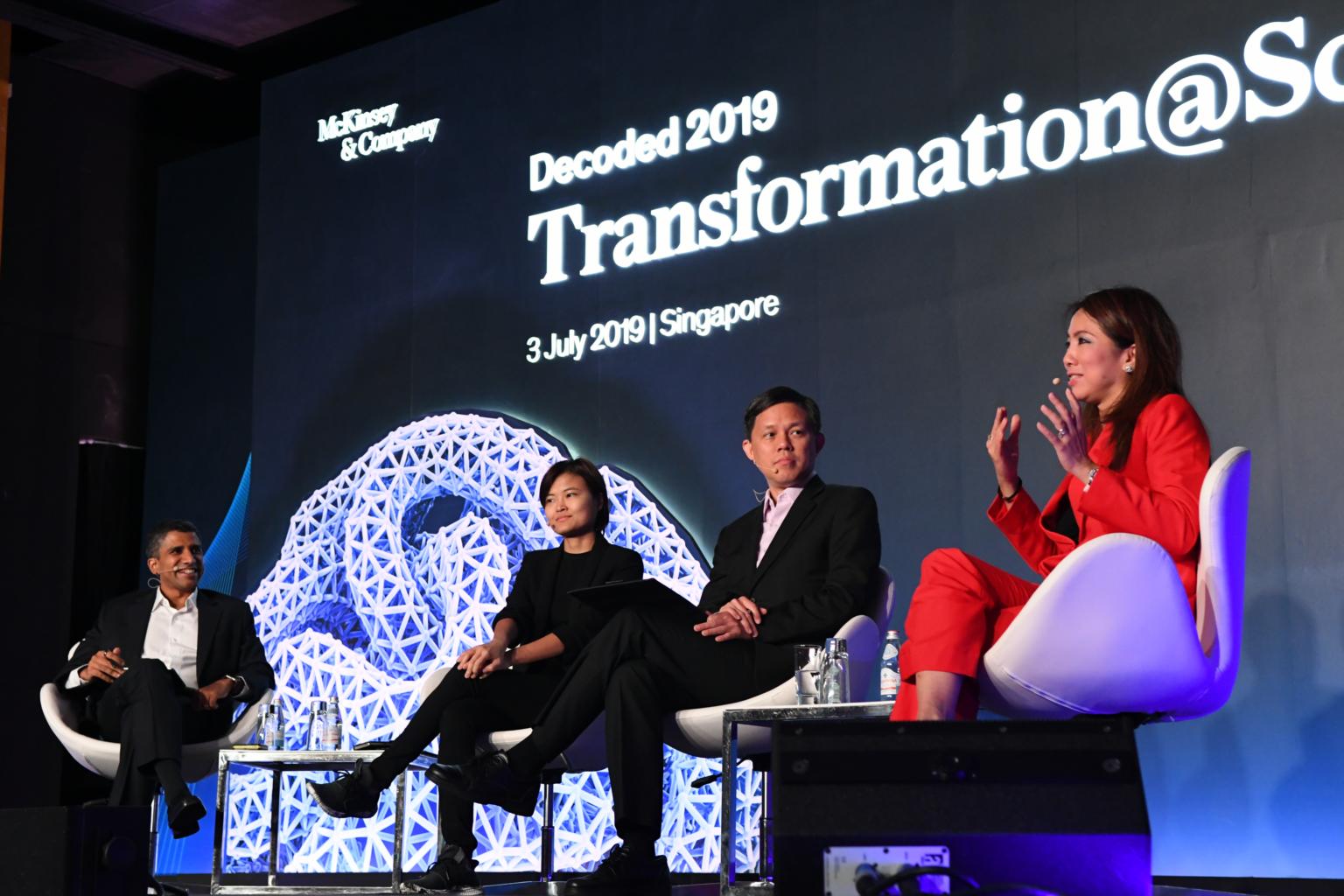Successful digital transformation in firms must involve all employees, say experts
Sign up now: Get ST's newsletters delivered to your inbox

(From left) Mr Vinayak HV, McKinsey Digital's South-east Asia senior partner and leader, moderated the dialogue on transformation featuring Grab co-founder Tan Hooi Ling, Minister for Trade and Industry Chan Chun Sing and DBS group head for institutional banking Tan Su Shan at a conference organised by McKinsey & Company, at The Ritz-Carlton, Millenia Singapore, on July 3, 2019.
PHOTO: COURTESY OF MCKINSEY & COMPANY
Follow topic:
SINGAPORE - A change in organisational culture is the key to driving success in companies grappling with digital transformation, business leaders were told on Wednesday (July 3).
For example, transformation at DBS started at the top, said the bank's group head for institutional banking Tan Su Shan.
The bank's chief executive and board of directors also gave staff the psychological safety to try new things, experiment, fail and move on, which has helped drive change.
"I often joke that DBS now stands for Digital Bank of Singapore," she said, adding in jest that Disappearing Bank of Singapore might be another good name if it can be so seamlessly integrated into customers' lives that it disappears.
To ensure that everybody was on board and had a sense of urgency, the bank reached out to its 26,000 employees with the messages that "tech is business and business is tech" and "no such thing as tech in the back and business in the front", said Ms Tan.
"Everyone knows 'hey, you better change, otherwise you're going to get Apple Bank, Facebook Bank, Google Bank eating our lunch'," she said.
She added that older employees have been able to keep up and learn new skills too.
For example, when the bank rolled out an app to help employees understand tech concepts like application programming interfaces and the cloud, most of the people who downloaded and learnt how to use them were employees over 50 years old.
Ms Tan was speaking at a conference on transformation organised by consultancy McKinsey & Company at The Ritz-Carlton, Millenia Singapore.
It was attended by about 300 senior business executives.
Grab co-founder Tan Hooi Ling said at the event that as the ride-hailing firm grew, the way it managed talent changed.
It evolved from having to "grovel" for talent in the first four years to now having to ensure people are joining the firm because they share the same values and not just because "they want an interesting name on their CV (curriculum vitae)", she said.
Both company leaders were speaking in a dialogue with Minister for Trade and Industry Chan Chun Sing, who agreed that a key challenge for organisations is how to inspire their entire workforce to work towards the same goal.
"Very often many companies and organisations will tell the employees, this is where I want to go, this is where I want our businesses to be."
"But they fail to translate it for employees who want to know 'what does it mean for the individual, how is it going to help me, how is it going to provide more opportunities for me'," he said.
Mr Chan said he was impressed during visits to DBS when he was labour chief.
In speaking to employees there he realised they knew clearly what the bank was doing in terms of transformation.
Mr Chan, who is Minister-in-charge of the Public Service - Singapore's biggest employer - also said that it is becoming increasingly important for the Government to build diverse teams as people flow in and out more quickly.
He said while an organisation needs to be very aligned and focused, it also needs people to inject new ideas and help check the blindspots of the team.
The bigger and older the organisation is, "the greater the challenge will be, and the greater the discipline we need to keep reminding ourselves of the need to build diverse teams and to keep our organisations porous where you have cross-pollination of ideas", he said.
Mr Chan noted that Singapore can thrive by remaining connected to the rest of the world, not just in terms of physical connectivity but also in terms of data, finance, talent, regulations and technology.
Speaking about how the Government can create an environment for companies to transform and innovate, Mr Chan said that while the stable rules-based system here attracts global talent, the Government can build a more collaborative culture with businesses.
He said he was struck during a visit to start-up campus Station F in Paris last year by how French government officials were looking at improving existing rules to be even more enabling for new ideas.
The officials were sent to Station F to help the start-ups navigate existing regulations.
Singapore, he said, can leverage the good quality of family life here to attract experienced tech talent to lead local graduates.
A conducive culture, together with putting hardware, progressive rules and free trade agreements in place, as well as training businesses and workers, will help Singapore seize the opportunities of digitalisation, he added.
At the event, Mr Chan also launched analytics firm QuantumBlack in Singapore, together with its chief executive Jeremy Palmer.
The company, which was acquired by McKinsey in 2015, aims to help clients across South-east Asia use data to optimise performance and grow.

